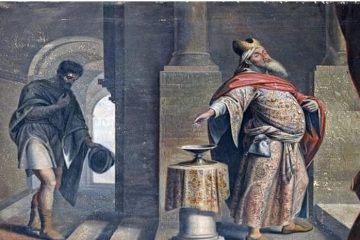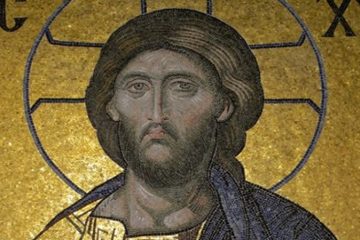Archimandrite Zacharias Zacharou
Today, one week after Pentecost, again we celebrate a feast, commemorating all the Saints that were well pleasing to the Lord in this life and partook of His imperishable life. Last Sunday we celebrated the coming of the Comforter and the immaculate Church, in her wisdom, has instituted this feast to commemorate all the Saints, the renowned fruit of the Holy Spirit. The Saints of every age provide palpable evidence of the truth of God and the wondrous Tabernacle built on earth with the coming of the Holy Spirit. They bear witness to the integrity of the Church who bears in her bosom these earth-bound Angels, these Heavenly men.
The secret Person, the Holy Spirit, the hidden friend, is revealed outright in His gifts to the Saints. The image of Christ is painted in the heart of the faithful by the Spirit of Truth, the Person of the Holy Spirit, and is marked upon the Saints of the Church in each age. The Holy Spirit gives an eschatological orientation to man’s life because He quickens, now in the present moment, Christ’s awaited coming, His burning presence, that will consume and destroy the lawless,[1] while stirring up a furnace of desire in the hearts of ‘those who loved His appearing’,[2] enabling them to ‘lay aside all earthly care’.
The hypostatic principle, as set forth by Saint Sophrony, is realised by all the Saints in their very being. The mystery of Pentecost is active in their lives at all times, as they attract the grace of the Holy Spirit and spread it out over the world, on behalf of which they untiringly intercede. ‘They were chosen of the Holy Spirit to pray for the whole world, and the Holy Spirit gave them a well-spring of tears.’[3] ‘The Lord bestowed the Holy Spirit upon the Saints and in the Holy Spirit they love us… The Holy Spirit gives His chosen such a wealth of love that their souls burn as it were with a flame, in their desire that all men should be saved and behold the glory of the Lord.’[4]
There are three levels of life: the unnatural, the natural and the Divine. The unnatural is the demonic life of eternal oblivion and hatred for God and man.[5] The natural is expressed in man’s love for ‘those who love him‘,[6] which is not censurable, but it is not enough for salvation. The supernatural life led by the Saints aims to recompense the Lord the tender love that we owe Him according to His commandment. The precepts of the Lord do not refer to the given fact of natural life, but to a supernatural life. They were imparted to man to detach him from the transient and shakeable, lifting him onto the transcendent level of divine love. The Holy Spirit heals ‘every wound hidden within us’, it cures the pestilence of forgetfulness of God, renews the soul and leads first to what is natural and then to what is beyond nature, as is attested by the Saints of all generations.
The man who tastes the gift of the Holy Spirit, irrevocably directs himself towards what is higher, because every separation from his Creator, albeit brief, creates an acute pain in his heart and he experiences an awesome darkness, all the terrors of hell, the corruption of death. In the eyes of the world this state appears to be madness. However, according to the Apostle Paul, it is ‘wiser than the wisdom of men’,[7] because God saved man through the madness and weakness of His love. As Saint Silouan writes: ‘The soul from love of the Lord has lost her wits as it were. She sits in silence, with no wish to speak, and looks upon the world with crazed eyes, having no desire for it and seeing it not.’[8]
Today’s Gospel reading,[9] a synthesis of verses from two different chapters of Saint Matthew’s Gospel, speaks about two elements that characterise the lives of the Saints: good confession and taking up the cross. In His incomprehensible condescension and goodness, the Lord granted the works of his hands parity with Himself, concluding a covenant with man on equal terms. If any man confesses Him, Christ will confess him as his own before the Heavenly Father. If any man forgives the small and relative sins of his fellow men, then God will forgive the great sins and evils that have affronted Him since before all ages.[10] Man’s confession belongs to the level of the temporary, the kingdom of transience. The confession of God takes place where ‘time is no longer’[11] and leads mortal earth-bound men into eternity.
Confession ‘in Christ‘is an inner confession of life in the Spirit. It is an imitation of the ethos of the Lamb of God ‘brought as a sheep to the slaughter’.[12] It is a life of holiness within the world of sin and passions. The true witness does not make portentous proclamations, but bears the living sensation of God in his heart. He speaks, walks, breathes as like unto the Son of God.
The Lord also witnesses in the Spirit to salvation within the heart of man, through the incorruptible consolation flooding him, through the ‘unique gift’ that makes him acceptable before the Heavenly Father and a member of the communion of the ‘spirits of the Saints made perfect’. This witness is possible when there is living communion with the Lord, a ‘bond of love’[13] and faith forged with Christ and all the members of His Body, because only together with all the Saints can anyone comprehend ‘what is the breadth, and length, and depth, and height; and know the love of Christ that passeth all knowledge’.[14]
Whoever is engrafted within the Body of Christ seals a covenant with the Lord. Already in this life, he tastes the first fruits of a dynamic relationship with Him that is always changing from fulness to fulness and will be perfected in eternity. The spirit that inspires this relationship differs fundamentally from the spirit of this world and inevitably splits the believer away from its values, so he makes ‘foes from his own household’.[15]
The Holy Spirit enlarges the heart to lead man ‘into all truth’, into all the fulness of divine love that enfolds ‘Heaven and earth and the nethermost parts of the earth’[16] with its Light. The epode of the Akathist for the Saints ends with the verse: ‘Rejoice thou, universal Fathers’. Some of these Saints never left the holes in the earth where they laboured in asceticism within the desert, but the content of their heart was all Adam, ‘from one end of the earth to the other, from the beginning of Creation till the end of times’ and they presented the whole world before the throne of God in their prayer of intercession.
As Saint Sophrony bears witness: ‘Wherever man may betake himself, whatever desert he may retire to, if he treads the path of real life in God he will live the tragedy of the world, and live it even more intensely and profoundly than those actually in the world, because the latter do not know what they are missing. Men suffer many privations but with the rare exception they are not conscious of their main lack. When they are deprived of their worldly goods and realise what they are missing, they suffer and lament; but what would the weeping and wailing be like if they realised their chief deprivation! With what ardour would they seek ‘the one thing needful’.[17]
According to the Apostle Paul, some people sow corruption through sinful actions, but others sow eternity through good works.[18] The fiery prayers of the Saints for their personal salvation and the salvation of the world are preserved by the angels until the Second Coming as precious incense in golden vials.[19] The Day of the Lord will be a surprise, not only because no one will know ‘the times or the seasons’,[20] but because all ‘the secret things of man’s heart’[21] will be made manifest. The genuine and faithful servants of God do not reveal the power of the Spirit and the love that they bear within them. Often the taking up of the cross is the hidden work of a man who battles again sin in the depths of his being, who seeks the Light of humility and strives not to trample upon the covenant that he has concluded with the Lord. He takes up the cross because he yearns not to be confined any longer within the suffocating frame of his own self, but to live for the Lord, Who bought him with His precious blood.
God promises divine equality, desiring to say to man, ‘all that I have is thine’,[22] but first he puts his true children to the test to see if they will respond with gratitude and philotimo to His promises and not answer, ’Have me excused, I cannot come.’[23] The judgement of the Lord’s unjust death is repeated in each of His Saints. He allows suffering and temptations in their life that try their heart like gold in a furnace.[24] ‘As gold in the furnace hath he tried them, and received them as a burnt offering.’[25] He permits that they may descend even into hell, not that they might perish, but so they might have the honour of knowing the path of the Lord Jesus unto the end. In this way, they may share in the victory of His Cross and Resurrection, becoming brethren of the ‘Firstborn’[26] and Beloved Son of love.
[1]. See 2 Thess. 2:8.
[2]. See 2 Tim. 4:8.
[3]. Saint Silouan, p. 396.
[4]. Ibid. p. 395-6.
[5]. See John 8:44.
[6]. See Matt. 5:46-47.
[7]. See 1 Cor. 1:25.
[8]. Saint Silouan, p. 504.
[9]. Matt. 10:32-33, 37-38 and 19:27-30.
[10]. See Matt. 6 :12.
[11]. Rev. 10:6.
[12]. See Isa. 53:7.
[13]. See Col. 3 :14.
[14]. Eph. 3:18-19.
[15]. See Matt. 10:36.
[16]. See Canon of the Resurrection, Ode 3.
[17] Saint Silouan, p. 227.
[18]. Cf. Gal. 6:8.
[19]. Rev. 5:8.
[20]. See Acts 1:7.
[21]. 1 Cor. 14:25.
[22]. Luke 15:31.
[23]. See Luke 14:16-20.
[24]. See Proverbs 17:3.
[25]. Wisdom of Solomon 3:6-7.
[26]. See Rom. 8:29.
Source: pemptousia.com




0 Comments